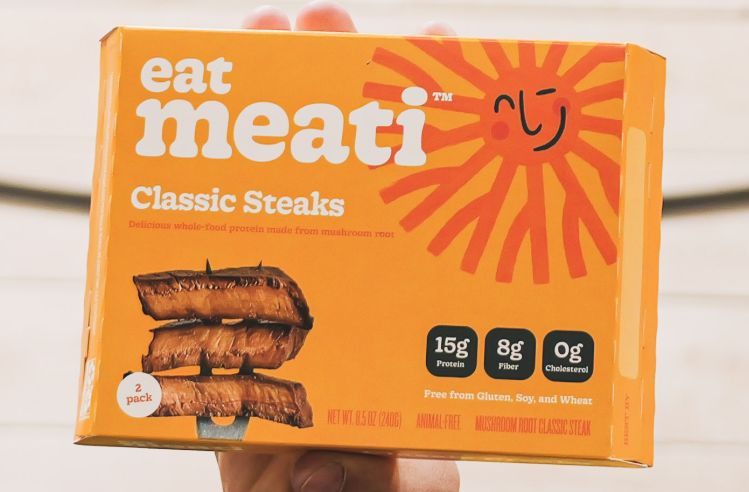The judge handling a protracted IP dispute between alt meat startups Meati Foods and The Better Meat Co (BMC) has ruled largely in BMC’s favor, throwing out Meati’s claim to BMC’s patents and accusing Meati of “inexplicable” tactics, “sandbagging,” and “shenanigans.”
The litigation* between the two firms—which both use submerged biomass fermentation to produce fungi-based meat alternatives from Neurospora strains—began in late 2021, with BMC filing a lawsuit accusing Meati (then known as Emergy) of sowing doubt over its IP in a bid to thwart its fundraising efforts. Meati in turn accused BMC of stealing its IP.
Colorado-based Meati was founded in 2015 by Dr Tyler Huggins and Dr Justin Whiteley, who initially focused on the potential of filamentous fungi to create infinitely renewable batteries, before pivoting to alt meat. The company—which has raised $365 million—recently started production at its ‘Mega Ranch’ in Thornton Colorado and now has steaks and cutlets in 6,000+ stores.
California-based BMC—which has raised a more modest $27 million—was founded in 2018 by Joanna Bromley, Adam Yee, and Paul Shapiro with an initial focus on supplying plant-based meat enhancers. In June 2021, it revealed it had been working behind the scenes on another project to produce a filamentous fungi-based meat alternative called Rhiza at a demo-scale plant in Sacramento.
The crux of the legal dispute
In July 2021 a US patent covering the above tech was assigned to BMC, with the named inventor listed as Augustus H. Pattillo, who had spent a year working with Meati through a Dept of Energy fellowship at the Argonne National Laboratory in Chicago. He went on to join BMC in early 2019.
According to court filings, Meati founders “Huggins and Whiteley did not believe it was possible for BMC to have brought a product to market so quickly on its own unless Pattillo had taken something” from Meati, and argued that Huggins and Whiteley should have been named inventors on the BMC patent.
BMC, in turn, argued that Meati had “provided no evidence that it had identified the novel claim terms of the BMC patent, had shared any of the concepts at issue with Mr. Pattillo, or was even actively researching meat replacement uses of mycelium prior to 2019.”
Despite repeated requests for specifics, claimed BMC, Emergy [Meati] has since failed to provide hard, admissible, evidence to “corroborate Huggins’ and Whiteley’s testimony that they, and not Pattillo, first conceived of the claims listed in Better Meat’s patents.”
In the course of the proceedings, BMC’s tortious interference and unfair competition claims were dismissed.
Judge: Meati has not provided hard, admissible evidence to support its patent claims
In an order filed in the Eastern District of California on June 7, the court largely agreed with BMC, with judge Kimberly J. Mueller allowing some trade secret claims made by Meati to proceed but rejecting Meati’s core arguments that its founders should have been named as inventors on the BMC patents.
Meati, she argued, “has not supported its opposition with citations of particular parts of materials in the record to corroborate Huggins’s and Whiteley’s testimony that they are among the inventors—or the sole inventors—who should be listed on the four Better Meat patents.”
Moreover, she noted, Meati served BMC “with almost three thousand pages” of documents the night before a May 17 hearing which it claimed supported its claims of inventorship. Yet Meati’s counsel offered “no credible explanation” of why Meati didn’t provide such materials sooner given that this case has been going on since December 2021, said Judge Mueller.
“In a case like this one—a case pending for more than two years in which the claimant can reasonably be expected to possess the evidence it would need to prove its claims—that claimant cannot avoid summary judgment through such sandbagging and shenanigans,” said Mueller, who has also accused BMC’s counsel of “wasting its client’s money, its own time and resources and the time and resources of this court” in previous rulings.
“Rather than showing there is any genuine dispute of material fact, Emergy’s [Meati’s] actions lead the court to doubt Emergy [Meati] is pursuing its claims for a proper purpose in the first place.”
She added: “The Better Meat Co claims that if the court does not resolve the pending motion now, it will likely ‘go out of business or into hibernation.'”
Litigation to come to a close
Neither party has commented about the implications of the ruling, although it is clearly good news for BMC, which has been trying to raise money to scale up its alt meat operation with a question mark hanging over its IP that this ruling now removes. Meati in turn has US Patent 11,751,596, which is directed to using Neurospora crassa as a food product, and is understood to be actively pursuing more.
While the judge found that Meati had “identified genuine disputes of material fact within the record” surrounding trade secret claims, AgFunderNews understands that both parties have now agreed to walk away from the litigation, ending their 2.5-year battle.
A Meati Foods spokesperson told us: “The case has been concluded satisfactorily and we don’t have any further comment at this time.”
A Better Meat Co. spokesperson added: “This case is now concluded, and we look forward to continuing to build a better food system.”
*The case is: The Better Meat Co v Emergy Inc et al. Case #2:21-cv-02338 filed December 12, 2021.














Sponsored
Sponsored post: The innovator’s dilemma: why agbioscience innovation must focus on the farmer first